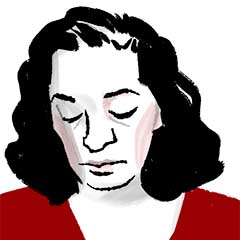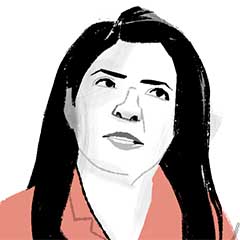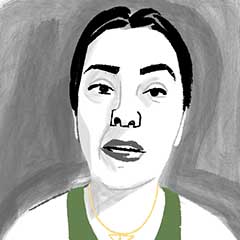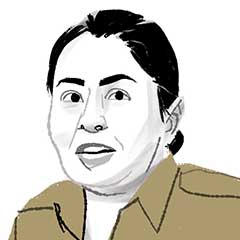Part 3
Immoral Code
M.S. was in the seventh grade when she was arrested and jailed for walking with a family friend who wasn't a relative.
By Elizabeth Walsh and Brian Williamson | VOA News

Tehran Province 1998
“I was leaving school ... just walking home, maybe a block from my school to home.”
“One of my mom’s friend’s sons happened to be heading towards the same direction.”
“He was four years older than me, the same age as my sister. I think they were dating at the time.”
“All of a sudden, one of the morality police cars stopped.”
“And they came at us, asking questions: ‘Are you guys related?’ ”
Upon learning that the boy wasn’t a relative, the police arrested both of them.
“They put me into custody and held me there for the night. [They] told my parents [to] come bail us out.”
“Inside, there were criminals. There were people who committed crimes, real crimes.”
“There was a woman there that I'll never forget.”
M. S.
a 39-year-old Iranian Canadian*
* M.S. asked that her name be withheld for safety reasons.
“This woman was sitting beside me, and she was sharing her story.”
ما عاشق هستیم...
“She was a married woman who committed adultery.”
“And the punishment for that is death row. So, she can be either stoned to death or she can be hung.”
Human rights groups have documented 150 people who were stoned to death between 1980 and 2009.
A small number of cases have occurred since then, but Iranian authorities continue to treat women as second-class citizens.
Today, 40 million women and girls are under surveillance by the country’s morality police.
Failure to wear a hijab or wear a hijab properly can result in an arrest, a fine, prison sentence or flogging.
Gender discrimination in Iran extends far beyond the compulsory hijab.
Married women are forbidden to leave the country without their husbands' permission.
Women and men do not share equal rights under the law with regards to divorce and custody of children.
Girls as young as 13 can be married, and according to the United Nations, the existing protections against violence fail to protect women and children.
“So, Mahsa Amini’s death was nothing that was surprising to us. But it just was a great display of what this regime is about for the world to realize.”
“This was a tipping point ... because everybody relates to her story. We all have been victims of this regime.”


Tehran Province 1998
“I was leaving school ... just walking home, maybe a block from my school to home.”
“One of my mom’s friend’s sons happened to be heading towards the same direction.”
“He was four years older than me, the same age as my sister. I think they were dating at the time.”
“All of a sudden, one of the morality police cars stopped.”
“And they came at us, asking questions: ‘Are you guys related?’ ”
Upon learning that the boy wasn’t a relative, the police arrested both of them.
“They put me into custody and held me there for the night. [They] told my parents [to] come bail us out.”
“Inside, there were criminals. There were people who committed crimes, real crimes.”
“There was a woman there that I'll never forget.”
M. S.
a 39-year-old Iranian Canadian*
* M.S. asked that her name be withheld for safety reasons.
“This woman was sitting beside me, and she was sharing her story.”
“She was a married woman who committed adultery.”
“And the punishment for that is death row. So, she can be either stoned to death or she can be hung.”
Human rights groups have documented 150 people who were stoned to death between 1980 and 2009.
A small number of cases have occurred since then, but Iranian authorities continue to treat women as second-class citizens.
Today, 40 million women and girls are under surveillance by the country’s morality police.
Failure to wear a hijab or wear a hijab properly can result in an arrest, a fine, prison sentence or flogging.
Gender discrimination in Iran extends far beyond the compulsory hijab.
Married women are forbidden to leave the country without their husbands' permission.
Women and men do not share equal rights under the law with regards to divorce and custody of children.
Girls as young as 13 can be married, and according to the United Nations, the existing protections against violence fail to protect women and children.
“So, Mahsa Amini’s death was nothing that was surprising to us. But it just was a great display of what this regime is about for the world to realize.”
“This was a tipping point ... because everybody relates to her story. We all have been victims of this regime.”


Tehran Province 1998
“I was leaving school ... just walking home, maybe a block from my school to home.”
“One of my mom’s friend’s sons happened to be heading towards the same direction.”
“He was four years older than me, the same age as my sister. I think they were dating at the time.”
“All of a sudden, one of the morality police cars stopped.”
“And they came at us, asking questions: ‘Are you guys related?’ ”
«اون کیه باهات؟ شما با هم نسبت دارین؟»
Upon learning that the boy wasn’t a relative, the police arrested both of them.
“They put me into custody and held me there for the night. [They] told my parents [to] come bail us out.”
“Inside, there were criminals. There were people who committed crimes, real crimes.”
“There was a woman there that I'll never forget.”
M. S.
a 39-year-old Iranian Canadian*
* M.S. asked that her name be withheld for safety reasons.
“This woman was sitting beside me, and she was sharing her story.”
“She was a married woman who committed adultery.”
“And the punishment for that is death row. So, she can be either stoned to death or she can be hung.”
Human rights groups have documented 150 people who were stoned to death between 1980 and 2009.
A small number of cases have occurred since then, but Iranian authorities continue to treat women as second-class citizens.
Today, 40 million women and girls are under surveillance by the country’s morality police.
Failure to wear a hijab or wear a hijab properly can result in an arrest, a fine, prison sentence or flogging.
Gender discrimination in Iran extends far beyond the compulsory hijab.
Married women are forbidden to leave the country without their husbands' permission.
Women and men do not share equal rights under the law with regards to divorce and custody of children.
Girls as young as 13 can be married, and according to the United Nations, the existing protections against violence fail to protect women and children.
“So, Mahsa Amini’s death was nothing that was surprising to us. But it just was a great display of what this regime is about for the world to realize.”
“This was a tipping point ... because everybody relates to her story. We all have been victims of this regime.”


Tehran Province 1998
“I was leaving school ... just walking home, maybe a block from my school to home.”
“One of my mom’s friend’s sons happened to be heading towards the same direction.”
“He was four years older than me, the same age as my sister. I think they were dating at the time.”
“All of a sudden, one of the morality police cars stopped.”
“And they came at us, asking questions: ‘Are you guys related?’ ”
«اون کیه باهات؟ شما با هم نسبت دارین؟»
Upon learning that the boy wasn’t a relative, the police arrested both of them.
“They put me into custody and held me there for the night. [They] told my parents [to] come bail us out.”
“Inside, there were criminals. There were people who committed crimes, real crimes.”
“There was a woman there that I'll never forget.”
M. S.
a 39-year-old Iranian Canadian*
* M.S. asked that her name be withheld for safety reasons.
“This woman was sitting beside me, and she was sharing her story.”
“She was a married woman who committed adultery.”
“And the punishment for that is death row. So, she can be either stoned to death or she can be hung.”
Human rights groups have documented 150 people who were stoned to death between 1980 and 2009.
A small number of cases have occurred since then, but Iranian authorities continue to treat women as second-class citizens.
Today, 40 million women and girls are under surveillance by the country’s morality police.
Failure to wear a hijab or wear a hijab properly can result in an arrest, a fine, prison sentence or flogging.
Gender discrimination in Iran extends far beyond the compulsory hijab.
Married women are forbidden to leave the country without their husbands' permission.
Women and men do not share equal rights under the law with regards to divorce and custody of children.
Girls as young as 13 can be married, and according to the United Nations, the existing protections against violence fail to protect women and children.
“So, Mahsa Amini’s death was nothing that was surprising to us. But it just was a great display of what this regime is about for the world to realize.”
“This was a tipping point ... because everybody relates to her story. We all have been victims of this regime.”

“My sister sends me videos from Iran every night, even if someone is old or ... they can’t participate in the protests... ”

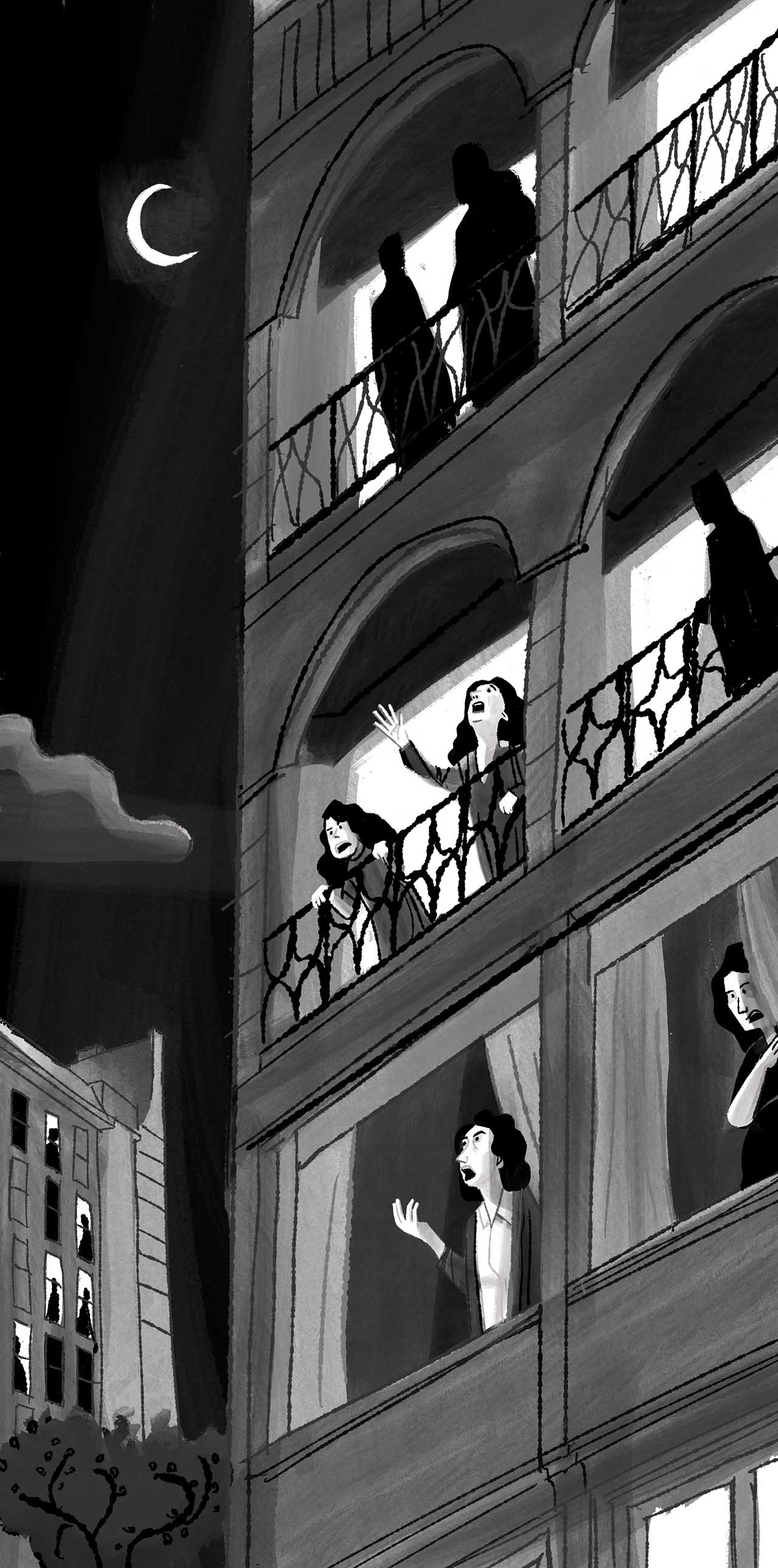
“... Every night at 9 o’clock, they open their windows and they start shouting slogans.”
“So, it has become a trend. Every night, people get out there and voice their opinions.”

“[The regime has started sending] plainclothes militias going around in every alley or street. And when they hear the voices coming from those particular houses, they start marking them.”
“First they mark it with a black X.”
“And then they come back and they spray it, literally, with red ... ‘under surveillance.’ ”
“There’s also another video where my brother is standing right outside of our house.”
“A black car comes, and four of these plainclothes get out of it, and they start trying to take my brother in with them because he left the house that was marked.”
“My brother is very small, and these people are big, and they have guns in their hands.”
“My brother is very small, and these people are big, and they have guns in their hands.”
“And as soon as [the cops] saw the neighbors and how people are coming out to see what is going on, they prepared to just get in their cars and leave.”
“He got very lucky.”
“I was in Iran for eight months the last time I went.”
Iran 2019
“I was pregnant again with my daughter, and I was walking down the street.”
“I just went to get an ultrasound for the baby.”
“It was hot.”
“I was pregnant.”
“And I had to wear this hijab.”
“And for someone like me, who has lived that life but then has been out for [a few years]..."
“You go back in there, and you’re, like, in jail again.”

“[The regime has started sending] plainclothes militias going around in every alley or street. And when they hear the voices coming from those particular houses, they start marking them.”
“First they mark it with a black X.”
“And then they come back and they spray it, literally, with red ... ‘under surveillance.’ ”
“There’s also another video where my brother is standing right outside of our house.”
“A black car comes, and four of these plainclothes get out of it, and they start trying to take my brother in with them because he left the house that was marked.”
“My brother is very small, and these people are big, and they have guns in their hands.”
“But he just got lucky because the neighbors heard it and ... came out.”
“And as soon as [the cops] saw the neighbors and how people are coming out to see what is going on, they prepared to just get in their cars and leave.”
“He got very lucky.”
“I was in Iran for eight months the last time I went.”
Iran 2019
“I was pregnant again with my daughter, and I was walking down the street.”
“I just went to get an ultrasound for the baby.”
“It was hot.”
“I was pregnant.”
“And I had to wear this hijab.”
“And for someone like me, who has lived that life but then has been out for [a few years]..."
“You go back in there, and you’re, like, in jail again.”

“[The regime has started sending] plainclothes militias going around in every alley or street. And when they hear the voices coming from those particular houses, they start marking them.”
“First they mark it with a black X.”
“And then they come back and they spray it, literally, with red ... ‘under surveillance.’ ”
“There’s also another video where my brother is standing right outside of our house.”
“A black car comes, and four of these plainclothes get out of it, and they start trying to take my brother in with them because he left the house that was marked.”
“My brother is very small, and these people are big, and they have guns in their hands.”
“But he just got lucky because the neighbors heard it and ... came out.”
“And as soon as [the cops] saw the neighbors and how people are coming out to see what is going on, they prepared to just get in their cars and leave.”
“He got very lucky.”
Iran 2019
“I was in Iran for eight months the last time I went.”
“I was pregnant again with my daughter, and I was walking down the street.”
“I just went to get an ultrasound for the baby.”
“It was hot.”
“I was pregnant.”
“And I had to wear this hijab.”
“And for someone like me, who has lived that life but then has been out for [a few years]..."
“You go back in there, and you’re, like, in jail again.”

“First they mark it with a black X.”
“[The regime has started sending] plainclothes militias going around in every alley or street. And when they hear the voices coming from those particular houses, they start marking them.”
“And then they come back and they spray it, literally, with red ... ‘under surveillance.’ ”
“There’s also another video where my brother is standing right outside of our house.”
“A black car comes, and four of these plainclothes get out of it, and they start trying to take my brother in with them because he left the house that was marked.”
“My brother is very small, and these people are big, and they have guns in their hands.”
“But he just got lucky because the neighbors heard it and ... came out.”
“And as soon as [the cops] saw the neighbors and how people are coming out to see what is going on, they prepared to just get in their cars and leave.”
“He got very lucky.”
Iran 2019
“I was in Iran for eight months the last time I went.”
“I was pregnant again with my daughter, and I was walking down the street.”
“I just went to get an ultrasound for the baby.”
“It was hot.”
“I was pregnant.”
“And I had to wear this hijab.”
“And for someone like me, who has lived that life but then has been out for [a few years]..."
“You go back in there, and you’re, like, in jail again.”
